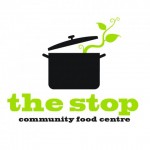Community Food Centres Canada Fighting for Greater Food Education and Empowerment Across Communities
Posted: October 29, 2013
Categories: News from Sustain Members
 The Stop Community Food Centre in Toronto strives to increase access to healthy foods while also maintaining dignity, health, and a sense of community. Though it began as a simple food bank, the Stop is now an internationally respected community food centre that provides a space for the surrounding community to come together to cook, grow, and share food.
The Stop Community Food Centre in Toronto strives to increase access to healthy foods while also maintaining dignity, health, and a sense of community. Though it began as a simple food bank, the Stop is now an internationally respected community food centre that provides a space for the surrounding community to come together to cook, grow, and share food.
Going beyond emergency relief services, the Stop offers community cooking programs bringing together individuals and families to prepare healthy, culturally diverse and inexpensive meals, an after school program aimed at teaching children aged 8-12 basic cooking skills, and an urban agriculture initiative that yields over 4,000 pounds of fresh organic produce for the Stop’s programs every year.
Nick Saul, who served as the Executive Director of the Stop from 1998 to 2012, is now the CEO of Community Food Centres Canada, an organization working to bring the Stop’s innovative approach to addressing issues of hunger and inequality to communities across Canada. As part of this project, Saul has co-authored The Stop: How the Fight for Good Food Transformed a Community and Inspired a Movement with writer Andrea Curtis.
In a recent piece in Civil Eats, Saul and Curtis highlight the distinction between the food bank and community food centre models, advocating for the latter as a more effective means of tackling hunger and growing inequality:
When I began to understand that the small, inadequately resourced Toronto food bank I ran was little more than a stop-gap measure, and I saw the number of people coming to our door just keep rising, my colleagues and I decided something big had to change. Over time, we built a vibrant, multidimensional space called a Community Food Center that offers not just handouts, but opportunities for our diverse low-income neighborhood to come together to cook, grow, and share food.
Equally important, we created the space for people to advocate for themselves and others for progressive changes to the political and social landscape. Changes like a minimum wage they can actually live on, affordable housing and childcare, and support for the kind of sustainable agriculture that benefits not just the wealthy, but everyone and the environment, too. Today, we’re creating Community Food Centers across Canada as prevention-based alternatives to a moribund food bank model.
For more information on the community food centre model, visit Community Food Centres Canada.
